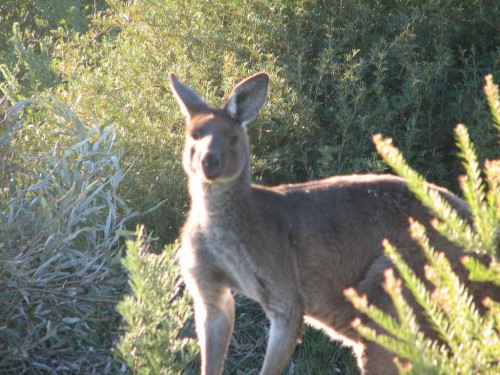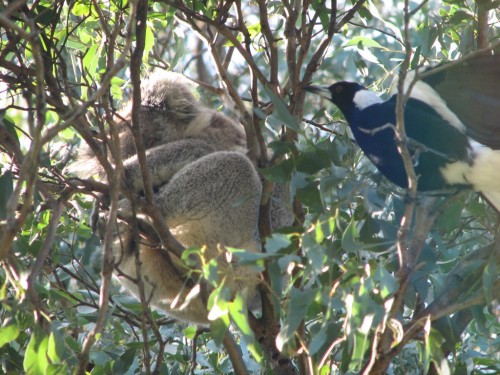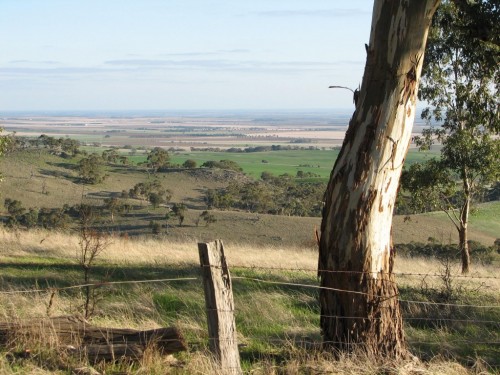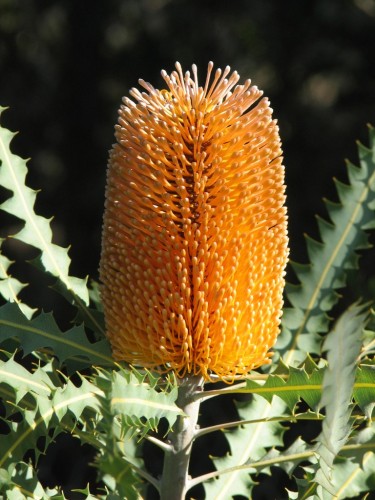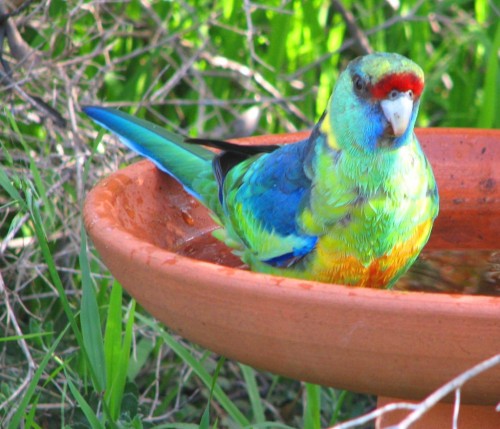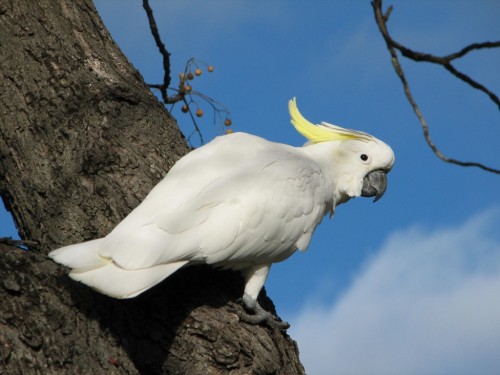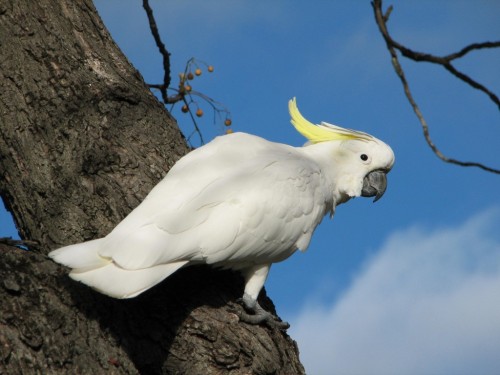Australia Day
January 26th is celebrated throughout Australia as our National Day. It was on this day in 1788 that this new country was founded by the first European settlers to arrive here. I thought I’d share a few images of things that are quintessentially Australian as my way of celebrating Australia day, and sharing something of our country with others.
Australia is known for its wonderful wildlife. The kangaroo would have to be one of the most recognisable members of our fauna. The cuddly look of the Koala would also be recognised world wide.
Australia is also known for its amazing array of plants and wildflowers. Probably the most easily recognised tree would be the eucalypt (or gum) tree. There are hundreds of different species; I will show only one here. This scene, taken in the mid north farming area of South Australia, is typical of many parts of our land.
Of our stunning array of wildflowers, the banksia is easily recognised by many Australians. These magnificent plants give an amazing display when in full flower. The birds go crazy feeding on the nectar and seeds they produce. Photographers, artists and gardeners go equally crazy over them
Now we turn to the birds. With about 800 species Australia is a plentiful land for the bird lover. Our vast range of parrots and honeyeaters, blue wrens and emus, waterfowl, waders, bush birds and sea birds attract birders from the world over. I’ve just chosen several to feature here.
Australia has so many beautiful birds it is hard just to show only two. Many more are featured in my photo gallery here.
Finally, one of Australia’s most recognisable landmarks, the Sydney Opera House.Playing with words
The Washington Post’s Mensa Invitational once again asked readers to
take any word from the dictionary, alter it by adding, subtracting, or
changing one letter, and supply a new definition. Here are this year’s
winners. Read them carefully. Each is an artificial word with only one
letter altered to form a real word.1. Intaxication: Euphoria at getting a tax refund, which lasts until
you realize it was your money to start with.2. Reintarnation: Coming back to life as a hillbilly.
3. Bozone (n.): The substance surrounding stupid people that stops
bright ideas from penetrating. The bozone layer, unfortunately, shows
little sign of breaking down in the near future.4. Cashtration (n.): The act of buying a house, which renders the
subject financially impotent for an indefinite period.5. Giraffiti: Vandalism spray-painted very, very high.
6. Sarchasm: The gulf between the author of sarcastic wit and the
person who doesn’t get it.7. Inoculatte: To take coffee intravenously when you are running late.
8. Hipatitis: Terminal coolness.
9. Osteopornosis: A degenerate disease. (This one got extra credit.)
10. Karmageddon: It’s like, when everybody is sending off all these
really bad vibes, right? And then, like, the Earth explodes and it’s
like, a serious bummer.11. Decafalon (n.): The grueling event of getting through the day
consuming only things that are good for you.12. Glibido: All talk and no action.
13. Dopeler effect: The tendency of stupid ideas to seem smarter when
they come at you rapidly.14. Arachnoleptic fit (n.): The frantic dance performed just after
you’ve accidentally walked through a spider web.15. Beelzebug (n.): Satan in the form of a mosquito, that gets into
your bedroom at three in the morning and cannot be cast out.16. Caterpallor (n.): The color you turn after finding half a worm in
the fruit you’re eating.And the pick of the lot:
17. Ignoranus: A person who’s both stupid and an a__hole.
Thanks to Desire Hendrick’s for posting this on her blog A conservancy of one: exploring the craft of writing and life.
Postscript: A few days ago I wrote about the problem of bloggers merely copying the writing of others without bothering to add any value to the original. I’ve just broken my own rules by posting this list without comment.
I really couldn’t add anything to this list.
It’s completely brilliant.
One day I may come up with a few new “words” of my own.
Writing Hint #20 Get rid of clutter
I have declared the year 2007 as The Year to Get Rid of Clutter.
I currently do most of my writing in a room that used to be my son’s bedroom. When he left for university and married a few years later we converted this room into our office. Previously a corner of our own bedroom was the office area. Over the last ten years this “new” office has been well used. And it shows.
The clutter is – well, to be really honest – disgusting. Some writing magazines and occasionally a newspaper will feature author’s writing rooms, with the said writer posed romantically at his or her desk being very productive. Often these rooms are lined with bookshelves and everything seems so neat and proper. I can guarantee that each one of them had weeks of warning before the photographer arrived. They always seem so productive and sterile. I can also guarantee that reality is far from this pretty picture.
I have decided to start getting rid of all the clutter in my office. This is my theory: get rid of all that clutter and that will free my mind and energy so that it can be channelled into more creative pursuits.
Like writing.
So last week I started in ernest. The first object of my enthusiasm was the 30cm high pile of bank statements, old accounts (I was pleased to find that all had been paid), notes, jottings, miscellaneous pieces of paper, the odd magazine and the like. Many were filed in the nearby filing cabinet (which sadly also needs my attention). Some were shredded. In fact, hundreds of sheets went through the poor little shredder.
The next object of my newly found cleanliness fetish was the bookshelf above my desk. I have a lineup of a dozen or so magazine boxes. They have been crammed to overflowing with old magazines. Why I was keeping all those writing magazines I do not know. I had read every one of them. Some were more than ten years old. In a crazy wave of renewed enthusiasm to get rid of clutter I threw most of them out. Well – they are currently in a big box ready to take to a paper recycling centre.
Some of these magazines I did keep. The most recent two or three. Those which featured some of my writing were also kept. (Note to self: build an archives shed out in the back of the garage.) I also trolled through some for interesting articles to pull out for rereading. Not too many. They will also be shredded if I don’t use them in the next few weeks.
The next centre of attention was the comfortable chair near my desk. It is used for reading (and snoozing in when I get tired). It was covered in books, newspapers, unread magazines, travel brochures, maps, more accounts waiting to be filed and… well, you get the picture.
Still to be done:
- Several boxes of assorted papers, folders, first drafts, correspondence and the like.
- A large pile of unread newspaper literary pages.
- A larger pile of unread literary, travel and nature magazines.
- A daunting gathering of unread books on the bookshelves behind my desk.
- An old, rarely used desktop PC that hasn’t been fired up for about six months. It dominates my desk; it needs to be archived too.
All this just makes me feel tired.
I think I need a little snooze – but my comfy chair still has a few things on it and there is no room on the floor.
Oh, the floor is cluttered too.
Idiom #13: A feather in one’s cap
This week’s idiom:
“A feather in one’s cap.”
Meanings:
A special achievement or acknowledgment of one’s work or efforts is said to be “a feather in one’s cap.”
Origins:
A number of different cultures around the world celebrate victory over an enemy or the killing of an enemy by placing a feather somewhere on the head, as in the head-dress of the American Indians. Feathers still feature prominently in the ceremonial apparel of many cultures, from the highland chiefs in Papua New Guinea with their elaborate head-dresses made from the feathers of a Bird of Paradise through to the ostrich and heron feathers used in the cap of members of the Most Noble Order of the Garter in Great Britain.
Today, the common expression is used of anyone who has accomplished some special achievement.
Example:
- Winning the seven year old race on Sports Day is certainly a feather in your cap.
